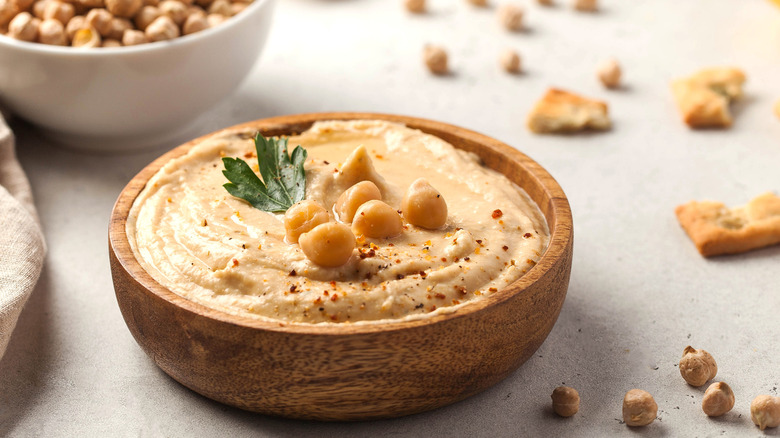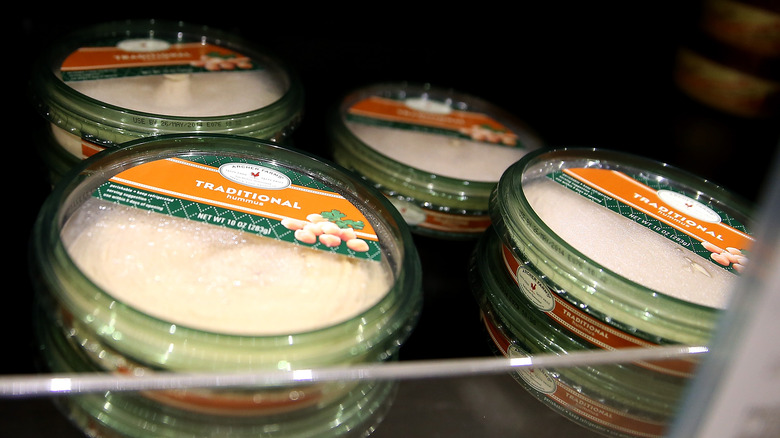The Surprisingly Healthy Refrigerated Snack You Can Buy At A Gas Station
When you make a quick stop at a gas station, do you pay attention to the nutritional content of the snacks on offer? While you might be inclined to just reach for the potato chips or a chocolate bar to give you some energy for the rest of your ride, there are quite a number of surprisingly healthy gas station snacks you can buy. Hummus, made primarily with chickpeas, is one such option. Typically found in the refrigerated section, hummus is packed with nutrients (provided you eat it with the right accompaniment, of course).
The history of this classic chickpea and tahini paste recipe has been contested. Some say that it's part of the traditional Mediterranean diet, while others claim that it is a Jewish food (per BBC). Regardless of its true origins, the classic recipe for hummus contains chickpeas (also known as garbanzo beans) as the main ingredient, as well as tahini, lemon juice, garlic, salt, and extra virgin olive oil. Let's look at the health benefits of this gas station snack.
Hummus is a good source of protein and fiber
A 100-gram serving of hummus contains 3.33 grams of protein, 16.67 grams of fat, and 3.30 grams of fiber, per the U.S. Department of Agriculture. Proteins are often called the building blocks of the body, and with good reason. Aside from playing a crucial role in bolstering our immune system, our hair, muscles, nails, skin, and organ health all depend on this essential nutrient, per WebMD. The fiber content in chickpeas keeps you full for longer, which is probably why hummus is recommended to those who are watching their weight. Additionally, fiber is great for gut health and digestion.
According to Atlanta-based registered dietitian Jerlyn Jones, chickpeas are also packed with iron, magnesium, and B vitamins (via Prevention). Add to that the nutritional profile of tahini, olive oil, and garlic, and you're picking a truly healthy snack. Antioxidant-rich olive oil, tahini, and garlic are known for their anti-inflammatory properties that help combat heart disease, certain cancers, and other chronic illnesses. Hummus is also low on the glycemic index, which makes it a good snack for people concerned about blood sugar spikes. Per registered dietitian Pam Fullenweider, who specializes in the Mediterranean diet, this tasty snack "is an excellent choice for people with dietary intolerances or allergies because it is naturally gluten-, nut-, and dairy-free."
It is important to remember, however, that hummus can have different variations. And when it comes to gas station snacks in particular, there are some things to keep in mind.
What to look for in gas station hummus
Aside from pairing your hummus with something healthy like carrot sticks, some things to watch out for include its sodium content, list of added preservatives, and added sugars.
Look for a product that contains as few ingredients as possible, and make sure you understand what you're reading on the label. While it might be difficult to find something exactly like the homemade kind, stick to a brand that has most (if not all) the classic ingredients. Preservatives to watch out for include potassium sorbate and sodium benzoate (via Prevention). Even though you may not think of it, there are products that will have added sugars like corn syrup and cane sugar, so this is something to keep in mind as well.
When it comes to sodium content, look for hummus that contains 80 milligrams or less per two-tablespoon serving, according to Los Angeles-based registered dietitian Lindsey Pine (via TIME). Also, the somewhat uncomfortable truth about gas station snacks is that it's very easy to binge on them, especially when you're tired, hungry, and bored, or if it's been a while since your last proper meal. The same applies to hummus, regardless of the fact that it's one of the best snacks to munch on when you're on the go. The oil content and tahini paste in the snack make hummus a significantly calorie-rich food, so avoid polishing off the entire tub in one sitting.



